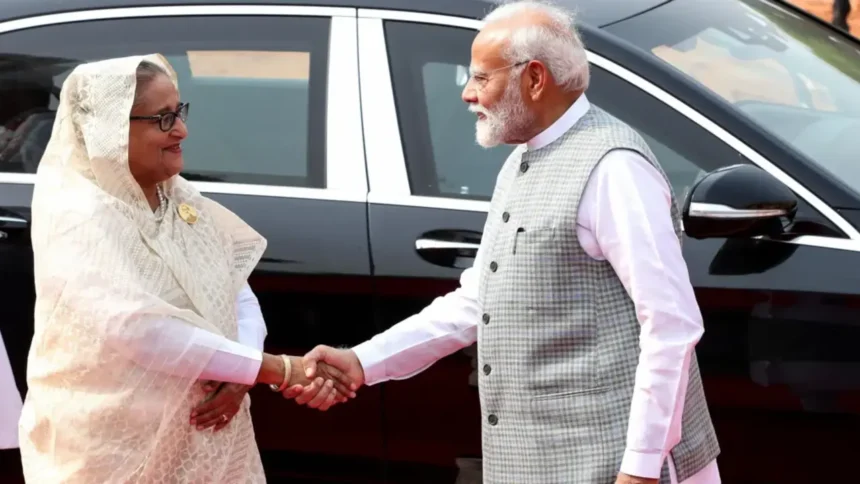September 3, 2024, Delhi, India: In a dramatic turn of events, former Bangladesh Prime Minister Sheikh Hasina has found herself stranded in India after a chaotic exit from Dhaka on August 5, 2024. The political upheaval in Bangladesh has placed India in a challenging position as it seeks to navigate the complex diplomatic landscape.
Key Highlights:
- Sheikh Hasina fled Bangladesh amid widespread unrest and violent protests, landing in India in early August.
- Hasina’s presence in India complicates Delhi’s relations with the new interim government in Bangladesh and threatens longstanding bilateral cooperation.
- The turmoil in Bangladesh highlights broader regional issues, including India’s influence and China’s growing presence.
- Hasina’s efforts to seek asylum in the UK, US, and UAE have been unsuccessful, leaving her in diplomatic limbo.
- India faces the delicate task of balancing support for a former ally with maintaining strong ties with the interim government and managing regional stability.
On August 5, 2024, Sheikh Hasina’s exit from Bangladesh came after weeks of escalating student protests and nationwide unrest. Her sudden departure to India has created a diplomatic dilemma for Delhi, which must now address both the fallout from Hasina’s ouster and the implications for its relationship with the new interim administration in Dhaka.
Also Read: Lawrence Bishnoi Threatens Salman Khan; New Revelations in Mumbai Shooting Incident
India has long viewed Bangladesh as a strategic partner, particularly due to their extensive shared border and mutual security interests. During Hasina’s 15-year tenure, relations between the two nations flourished, marked by significant trade agreements and infrastructure support from India. This relationship is crucial for India, especially in securing its northeastern states from insurgent activities.
However, Hasina’s unexpected exit has complicated matters. The interim government in Dhaka, led by Muhammad Yunus, represents a shift from the pro-India stance of Hasina’s Awami League party. This transition presents a challenge for India as it attempts to foster positive relations with the new leadership while addressing any residual tensions from Hasina’s tenure.
The situation in Bangladesh also reflects broader regional dynamics. India’s endorsement of Hasina’s government during controversial elections has contributed to local grievances against New Delhi. These grievances are exacerbated by recent diplomatic setbacks with other neighboring countries, such as the Maldives and Nepal, which have expressed resistance to Indian influence.
Moreover, China’s growing influence in the region adds another layer of complexity. Beijing’s outreach to Bangladesh and its proactive engagement with the Maldives underscore the shifting regional power dynamics, compelling India to reassess its strategies and relationships.
Also Read: Kangana Ranaut Announces Patriotic Film “Bharat Bhhagya Viddhaata”: A Tribute to Unsung Heroes
Hasina’s unsuccessful attempts to seek asylum in the UK, US, and UAE have left her in a precarious situation in India. This predicament places Delhi in a difficult position, as it must balance the need to support a former ally with the necessity of cultivating strong ties with Bangladesh’s new government.
The Indian government’s swift outreach to Yunus and efforts to manage the diplomatic fallout are indicative of its attempt to stabilize relations and maintain its regional influence. However, the perceived trust deficit, particularly with opposition figures like the Bangladesh Nationalist Party (BNP), poses a challenge for India’s diplomatic strategy.
For India, the immediate challenge is to navigate its support for Hasina while engaging constructively with the interim government. The possibility of an extradition request from Bangladesh adds urgency to the situation, but Delhi must tread carefully to avoid exacerbating tensions.
Analysts suggest that India’s regional policy may require recalibration to better accommodate the perspectives of its neighbors. As the situation evolves, India’s diplomatic efforts will need to balance immediate concerns with long-term regional stability and influence.
Source: link











